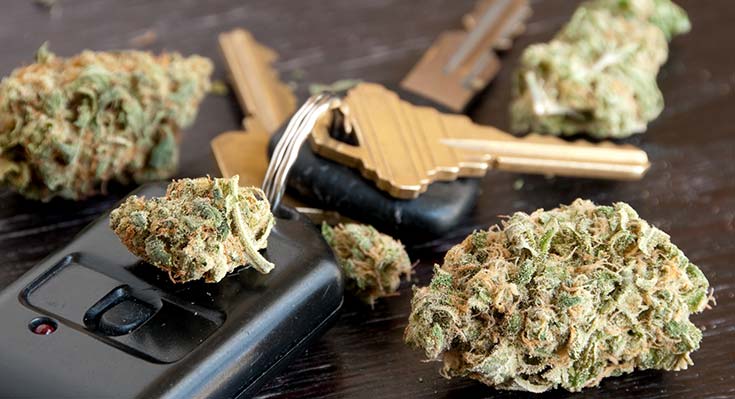victims for over 25 years.
How Does “DUI” Apply to Marijuana & What is the Marijuana DUI Test?
 Colorado continues to blaze a trail for other states when it comes to legalized marijuana. Let’s face it: we’ve had our ups and downs since the vote in November 2012 when our state passed Amendment 64, which legalized recreational marijuana. From “cannabis tourism” to neighborhood spats to a huge spike in child overdoses, we are figuring out a lot of things as we go… for better or worse … especially when it comes to marijuana laws, as well as how we do marijuana DUI testing.
Colorado continues to blaze a trail for other states when it comes to legalized marijuana. Let’s face it: we’ve had our ups and downs since the vote in November 2012 when our state passed Amendment 64, which legalized recreational marijuana. From “cannabis tourism” to neighborhood spats to a huge spike in child overdoses, we are figuring out a lot of things as we go… for better or worse … especially when it comes to marijuana laws, as well as how we do marijuana DUI testing.
For this blog, which focuses on Denver personal injury topics, I want to write about DUI arrests and marijuana, and the associated marijuana DUI testing. I’ve seen quite a lot of misinformation on the internet about what it means to be impaired by marijuana or driving under the influence of marijuana. Like alcohol, I believe that there should be a very low threshold for people driving under the influence because the repercussions can be so tragic. However, marijuana is a tricky thing to measure since it stays in your system so much longer than alcohol.
This is a tricky and complicated issue. Regular users of marijuana will have higher THC levels in their blood even when they aren’t high.
A recent Colorado Public Radio story addressed the complexities:
“Colorado’s marijuana DUI law is modeled on the one for alcohol, which sets a number to determine when someone is too intoxicated to drive. For pot, that number is five nanograms per milliliter of blood. Anything above that and the law says you shouldn’t be driving.”
That’s a problem according to Tom Marcotte who runs The Center for Medicinal Cannabis Research at the University of California, San Diego.
“Unlike alcohol, which has a generally linear relationship between the amount of alcohol you consume, your breath alcohol content and driving performance, the THC route of metabolism is very different.”
That means blood and breath tests are not a good measure of marijuana intoxication. AAA released a study this spring backing that up, even saying states should wait to set marijuana impairment limits until the science improves.”
So, the recommendation is that we should wait to set marijuana DUI limits when it comes to testing. But what about the victims who are injured by drivers under the influence of marijuana? Yes, I understand that pot stays in your system longer and it can be hard to measure, but that doesn’t change the fact that a lot of people get behind the wheel when they are legitimately impaired by marijuana. And they hurt people.
Are Marijuana DUI Arrests Accurate?
 So, you see, this is a tricky and complicated issue. Regular users of marijuana will have higher THC levels in their blood even when they aren’t high. Now, before you go thinking, “Why would we want a regular pot user on our streets anyway? Hippies. Addicts. Derelicts,” and all the other things that stereotypically come to mind, remember this: medicinal marijuana is legitimately helping people deal with pain, anxiety, nausea and a whole host of other ailments. It provides incredible relief for the people who need it. So, should those people be terrified of getting behind the wheel simply because they took pot for their ailments?
So, you see, this is a tricky and complicated issue. Regular users of marijuana will have higher THC levels in their blood even when they aren’t high. Now, before you go thinking, “Why would we want a regular pot user on our streets anyway? Hippies. Addicts. Derelicts,” and all the other things that stereotypically come to mind, remember this: medicinal marijuana is legitimately helping people deal with pain, anxiety, nausea and a whole host of other ailments. It provides incredible relief for the people who need it. So, should those people be terrified of getting behind the wheel simply because they took pot for their ailments?
Science has proven that regular users maintain high levels of THC, but it does not necessarily mean they are unimpaired. Clearly, the ways we do a marijuana DUI test need to develop and mature. We need to accept that there isn’t going to be an easy, chemically based roadside test for pot, the way there is currently for alcohol (breathalyzer). If one is in development, it could be a while before it hits the mainstream. In the meantime, we need to protect our roads from truly impaired drivers. How do we do that?
We simply don’t have a test like the breathalyzer to test for marijuana impairment.
Roadside Marijuana DUI Tests for Impairment
 Luckily, our police officers are trained to recognize impairment. That could mean impairment from alcohol, impairment from marijuana, or impairment from any number of other drugs that people put into their bodies. If you are impaired, cops truly don’t care how you did it. They want to get you off the streets.
Luckily, our police officers are trained to recognize impairment. That could mean impairment from alcohol, impairment from marijuana, or impairment from any number of other drugs that people put into their bodies. If you are impaired, cops truly don’t care how you did it. They want to get you off the streets.
The question is, do police officers know the signs of marijuana impairment? It turns out that the signs are very similar to alcohol impairment. A recent study published in the journal Accident Analysis and Prevention found that 96.7% of drivers who tested positive for recent cannabis consumption (and negative for alcohol or other drugs) failed at least two of these tests:
- A one-legged stand in which the driver counts down while holding one foot in the air
- Standing with eyes closed and estimating the passage of 30 seconds
- Touching the tip of the nose six times, three times with the index finger of each hand
- Taking a series of heel-to-toe steps in a prescribed way
Sound familiar? The fact that the roadside marijuana DUI test is similar to the roadside test for alcohol impairment shouldn’t be surprising, because, as I said above, impairment is impairment. The tricky part with pot is the gray area where cops might think a person might be impaired, but it’s right on the line of legality – we simply don’t have a test like the breathalyzer to test for marijuana impairment.
My recommendation for pot users: if you’re going to get high for fun, stay off the roads. Period. If you’re using pot for medicinal purposes, keep your medical marijuana card with you at all times and don’t leave pot paraphernalia lying around in your car. We are all part of Colorado’s grand marijuana experiment, but people should not die on the roads because you are a user.
8 Dos and Don’ts After a Car or Motorcycle Accident: A wrong move after an accident can cost you thousands of dollars. Don’t be caught off guard.
Free Consultation
Search For
Recent Articles
- Bicycle Accident Reported at 15th St and Wewatta St in Denver
- Motorcycle and Pickup Truck Collision on W 6th Ave Leaves No Serious Injuries
- Motorcycle and Bus Collision Reported at Blake and Downing Intersection
- Possible DUI Incident on E 9th Ave in Denver Leaves No Serious Injuries
- Motorcycle and SUV Collide at Denver Intersection in Mar Lee Neighborhood
Categories
- Arvada
- Aurora
- Auto Accident eBook
- Auto Insurance
- Bicycle
- Bicycle/Motorcycle Accidents
- Bodily injury
- Car accidents
- Centennial
- Colorado
- Colorado Legislature
- community
- Denver
- Denver Metro Motor Vehicle Accidents
- distracted driving
- DUI Accidents
- Englewood
- Events
- Flood Insurance
- Fort Collins
- Highlands Ranch
- Hit and Run
- In The News
- insurance companies
- Lakewood
- Littleton
- Marijuana DUI
- Motorcycle Accidents
- Motorcycle Insurance
- Motorcycle Law eBook
- Motorcycles
- Newsletter
- Pedestrian
- Personal Injury Law
- Press Release
- Safe Driving
- Safety
- Scooters
- technology
- Tips
- Uncategorized
- vibrio vulnificus bacteria
- Videos
- Westminster
- Winter Driving
- Wrongful Death
Archive
- July 2025
- June 2025
- May 2025
- April 2025
- March 2025
- February 2025
- January 2025
- December 2024
- November 2024
- October 2024
- September 2024
- August 2024
- July 2024
- May 2024
- April 2024
- March 2024
- February 2024
- January 2024
- December 2023
- November 2023
- October 2023
- September 2023
- August 2023
- July 2023
- June 2023
- May 2023
- April 2023
- March 2023
- February 2023
- January 2023
- November 2022
- September 2022
- April 2022
- March 2022
- February 2022
- January 2022
- December 2021
- November 2021
- October 2021
- September 2021
- August 2021
- July 2021
- June 2021
- May 2021
- April 2021
- January 2021
- December 2020
- November 2020
- October 2020
- September 2020
- August 2020
- July 2020
- June 2020
- May 2020
- April 2020
- March 2020
- February 2020
- January 2020
- December 2019
- November 2019
- October 2019
- September 2019
- August 2019
- July 2019
- June 2019
- May 2019
- March 2019
- February 2019
- January 2019
- December 2018
- November 2018
- October 2018
- September 2018
- August 2018
- July 2018
- June 2018
- May 2018
- April 2018
- March 2018
- February 2018
- January 2018
- December 2017
- November 2017
- October 2017
- September 2017
- August 2017
- July 2017
- June 2017
- May 2017
- April 2017
- March 2017
- February 2017
- January 2017
- December 2016
- November 2016
- October 2016
- September 2016
- August 2016
- July 2016
- June 2016
- May 2016
- April 2016
- March 2016
- February 2016
- January 2016
- December 2015
- November 2015
- October 2015
- September 2015
- August 2015
- July 2015
- June 2015
- May 2015
- April 2015
- February 2015
- November 2014
- October 2014
- September 2014
- July 2014
- June 2014
- May 2014
- April 2014
- March 2014
- February 2014
- January 2014
- October 2012
- September 2012
- August 2012
- July 2012
- February 2012
- March 2011
- October 2010